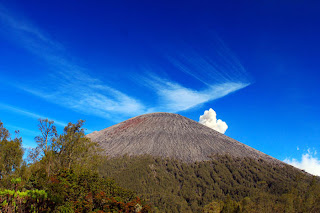Climb the highest peak of Java safely
As the highest peak of Java, Mt.
Semeru (Indonesian: Gunung Semeru) is a must for all travelers who include
climbing in their menu. It stands proudly at 3.676 meters above sea level and belches
out a thick smoke of ash and stones at a regular interval of fifteen minutes
(August 2013). Though it is not a technical climb, but this is certainly a very
difficult one and can be dangerous. You need to keep the following points in
mind if you want to climb it safely.
 |
| Sunrise from Mt. Penanjakan |
Are you suitable for this?
The climb requires you to hike 6-7
hours from the village of Ranu Pani (2.200 asl) to the Kalimati camp (2.700
asl) and another gruelling 4-5 hours to the summit. While the first part of the
climb you hike through flat savannas during the day, the second part needs a
very great effort as you have to scramble your way through rocks and sands
which keep falling off as you stepping up at night time. In addition, it is
quite hard to visualize how steep the surrounds are, so if you have serious
problem with heights, this climb might not be suitable for you.
 |
| It doesn't look as steep on the picture |
How to get there?
The major route to Gunung Semeru is from Malang-Tumpang. From
Juanda International Airport (Surabaya) take a bus to Arjosari bus station in
Malang. You can proceed by taking a microbus (locals calls it a mikrolet) to
Tumpang and then a 4WD vehicle or a heavy truck to Ranu Pani.
 |
| The white car is the 'mikrolet' |
Climbing permits
Due to
the risk of the climb, the Bromo Tengger Semeru National Park requires every
climber to have a health certificate from a doctor/hospital and a copy of
identity card/passport. The park also requires you to sign an agreement that
states : climbing to the summit is forbidden, you will camp in Kalimati and not
proceed your climb to the summit. The agreement is written in Indonesian so no
foreigners understand what it is about.
 |
| Kalimati Camp |
Equipments
Normally people climb Gunung Semeru for 3 days and 2 nights.
Camping gears such as a decent tent, sleeping bag, and cooking utensil are
mandatory. It is highly recommended to wear a trekking boots that wrapped ankles
as it would prevent sands getting into your shoes. Ensure you have sufficient
grip on your shoes as you will be walking in slippery surface of rocks. This is
a very easy trek to slip and twist an ankle or worse. When accident happened,
do not even imagine there will be an air-evacuation for you— you will have to
hobble out, so watch every step you make.
Weather
and temperature
The average annual precipitation in this area is 927 mm – 5.498
mm. Rainy season comes in November-April, during which the national park is
closed for visitors. The temperature on the summit ranges between 0-4 celcius.
Average temperature during the day ranges between 15-21 celcius and 3-8 at
night time. It is advisable to wear long pants
and some sort of fleecey top. Wet weather gear is also a good idea, as you may get some rain
at certain months. A pair of gloves is strongly recommended when you climb the
summit. Make sure they are fairly thin so you can still reach into nooks and
crannies when you’re traversing the steep rock faces.
Food and water
Take at least two litres of water — for the hike until you reach Kalimati base
camp and find the natural spring to refill your empty bottles. You will find a
lake Ranu Kumbolo (2.400 asl), however, the water is not drinkable. Carrying
some high energy snacks or a couple of chocolate bars are a good idea. You
should have some simple food for you.
Sunscreen
You will climb during the day and night. Unless getting sunburned is not a
problem for you, you must have a good sunscreen product.
Drugs
The climb up is extremely intense and, if you’re not an experienced climber,
you will need to have your wits about you. It is advisable you bring any drugs
that you may need againts the cold/sun/or any symptoms that you may have. You
can talk to a doctor about your physical condition.
Stop
often but no sitting down
The trail is more or less straight up on the way to the summit—
there are almost no switch backs. The relentless nature of the trail alone is strenuous.
Things are made worse by the quality of the surface. Up high you are often
scrambling on bare rock with plenty of rubble — big and small — while down low
the trail can be slippery and sandy. Cold wind blows hard on the steepest
terrain and resting too long would only weakens your body.
Contact a local guide
If it is your first time climbing Gunung Semeru, it is compulsory
to hire a guide. While joining agencies’ organized tour is considered
expensive, you may opt to hire a freelance guide. Guidebooks and other
travellers are also good sources for recommendations. Regardless of using
freelance guide or organized tours, you must manage to come the day before so
you can discuss the climb and so the guide can address any queries you may
have.
To get in touch with local guides : http://www.tourhq.com/index/guideDetails/Mjc2Mw==
very nice info thank you, will contact you soon
BalasHapusNice post.
BalasHapusKashmir taxi package
Kashmir car rental
Himalaya shialjit